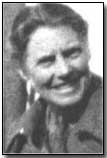Feature Articles - The Life of Evelina Haverfield - 1919-20: Final Years in Serbia
 In the summer of 1919 Evelina returned to Serbia with her little band of
British women, ready to find a location for their project and set to
work.
In the summer of 1919 Evelina returned to Serbia with her little band of
British women, ready to find a location for their project and set to
work.
They drove in an open touring car in search of a suitable location for the orphanage, and soon decided to establish it in the remote village of Baijna Bashta.
It was situated on the Drina River, which divides Bosnia from Serbia, and was surrounded by mountains. During this time, Evelina made several visits to the staff of the one remaining S.W.H. hospital still operating in Serbia.
Dr. Isobel Emslie, the doctor in charge, later wrote of these visits. "We all fell under the spell of her charm and radiant smile, and admired her beautiful face with its clear-cut, small features, her slim figure, and her spun-gold hair".
After about seven months of operation, impending disaster struck the staff and children of the orphanage. On March 21,1920 Dr. Emslie received a phone call from S.W.H. headquarters advising her that Evelina had died of pneumonia early that morning and she was asked to go to Baijna Bashta as soon as possible.
She took the chaplain to the Serbian Relief Fund with her, and travelled to the remote mountain village. On arrival, the chaplain conducted a funeral service in English before a large gathering of townspeople and orphans, who were greatly affected by their sudden loss.
Her death was tragically premature since she was only fifty-two years old, she was desperately needed by a host of poor and destitute children, and she had so much still to give to the war-ravaged country of her adoption.
The Belgrade papers expressed what many Serbs felt, that her death was a significant loss to the nation. In London, the papers recognized her support for women's suffrage, her impressive war service with Dr. Inglis, and her post-war work for Serbian orphans. One mentioned her part in founding women's organizations in 1914 which evolved into the military women's corps of the later years of the war.
But many felt her loss on a more personal level. One tribute came from a lady closely associated with Evelina during the last three years of her life. She expressed what many others felt.
"Her death is a real loss to the nation. She had all the qualities which make a womanly woman, and added to them magnificent courage and the divine quality of unselfishness. During the whole time I had the happiness to be associated with her, I never knew her to fail to stretch out her hand to help anyone who came to her for advice or help."
Over Evelina's grave, the Serbs erected a large granite headstone with the following epitaph inscribed on it.
Here lies the body of the Honourable Evelina Haverfield youngest daughter of William Scarlett 3rd Baron Abinger and of Helen Magruder his wife of Inverloky Castle Fort William Scotland who finished her work in Baijna Bashta March 21, 1920 through the war 1915-1920 she worked for the Serbian people with untiring zeal a straight fighter a straight rider and a most loyal friend. R.I.P
The reference to a straight rider reflects the Serbs' great admiration for Evelina's ability to ride with the best horsemen in the Serbian Army.
As a final gesture of appreciation, the Serbian Government bestowed on her, posthumously, their highest award, a medal for The Order of the White Eagle.
A "Communication Trench" was a narrow trench constructed at an angle to a defensive trench to permit concealed access to the defensive trench.
- Did you know?
